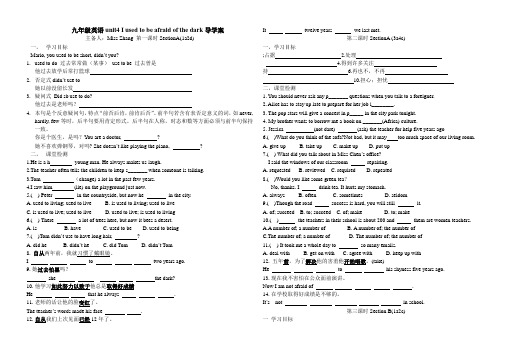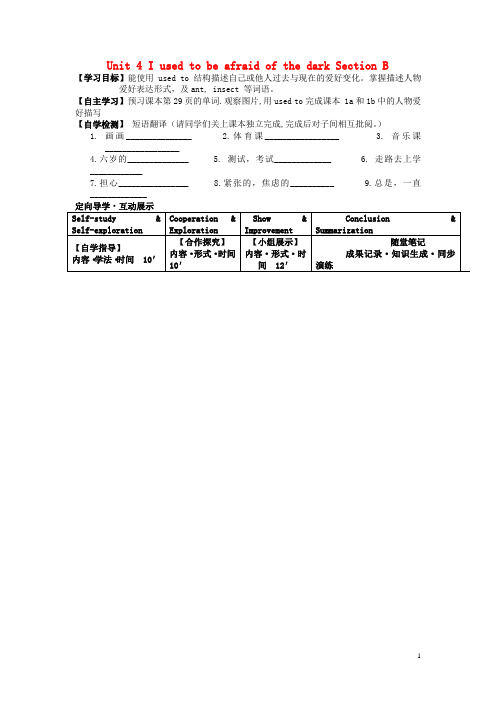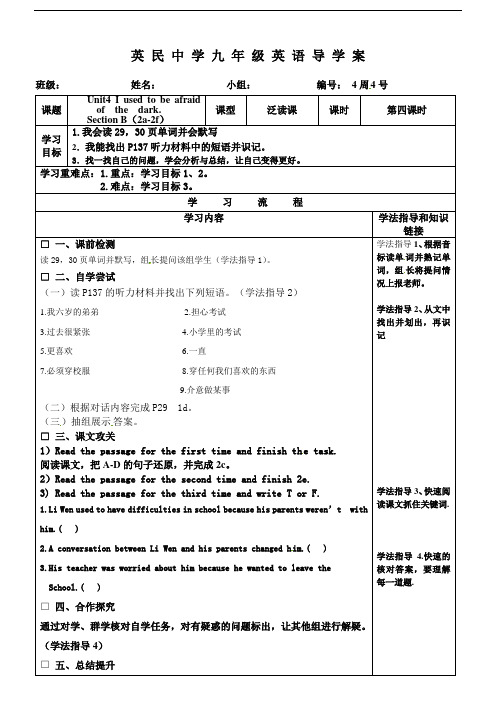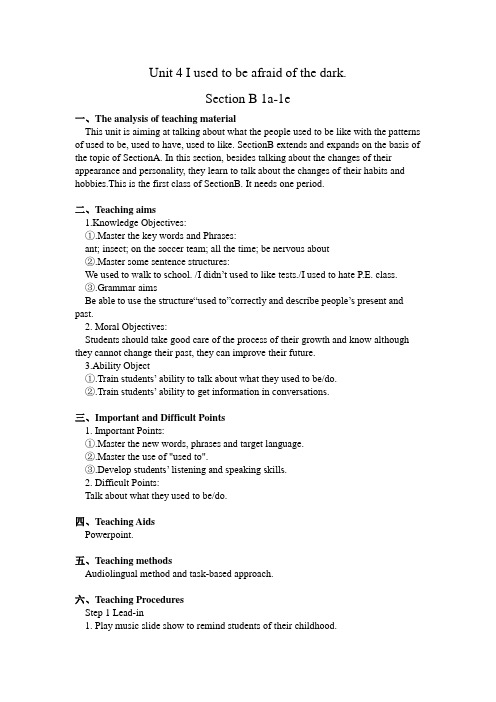2014年新版人教版九年级英语第四单元Section B导学案
Unit4导学案人教版九年级英语全册

九年级英语unit4 I used to be afraid of the dark导学案主备人:Miss Zhang 第一课时SectionA(1a2d)一,学习目标Mario, you used to be short, didn’t you?ed to do 过去常常做(某事)use to be 过去曾是他过去放学后常打篮球2.否定式didn’t use to她以前没留长发3.疑问式Did sb use to do?他过去是老师吗?4.本句是个反意疑问句,特点“前否后肯,前肯后否”。
前半句若含有表否定意义的词,如never,hardly, few等时,后半句要用肯定形式。
后半句在人称,时态和数等方面必须与前半句保持一致。
你是个医生,是吗?You are a doctor, ?她不喜欢弹钢琴,对吗? She doesn’t like playing the piano, ?二,课堂检测1.He is a h young man. He always makes us laugh.2.The teacher often tells the children to keep s_______ when someone is talking.3.Tom (change) a lot in the past few years.4.I saw him (lie) on the playground just now.5.( ) Peter in the countryside, but now he in the city.A. used to living; used to liveB. is used to living; used to liveC. is used to live; used to liveD. used to live; is used to living6.( ) There a lot of trees here, but now it bees a desert.A. isB. haveC. used to beD. used to being7.( )Tom didn’t use to have long hair, ?A. did heB. didn’t heC. did TomD. didn’t Tom8. 自从两年前,我就习惯了戴眼镜。
九年级英语上册 Unit 4 I used to be afraid of the dark Section B (1a-1e)导学案

Unit 4 I used to be afraid of the dark Section B【学习目标】能使用used to 结构描述自己或他人过去与现在的爱好变化。
掌握描述人物爱好表达形式,及ant, insect 等词语。
【自主学习】预习课本第29页的单词.观察图片,用used to完成课本 1a和1b中的人物爱好描写【自学检测】短语翻译(请同学们关上课本独立完成,完成后对子间相互批阅。
)1.画画_______________2.体育课_________________3. 音乐课_________________4.六岁的______________5. 测试,考试_____________6. 走路去上学____________7.担心________________ 8.紧张的,焦虑的__________ 9.总是,一直_____________m调跟读并自主核对答至【当堂检测反馈】(3’)根据汉语提示填空完成句子,每空一词 (关上书本,独立完成。
做完后对子间相互批阅。
)1. 我习惯收集蚂蚁和其他昆虫。
I used to collect ______ _____ _____ .2. 我的语文老师过去憎恨体育课。
My Chinese teacher ______ ______ ______ P..E class.3. 他过去常常走路去上学。
He used to ________ ________ _______?4. 李先生过去住在美国,所以习惯吃西餐。
Mr Li ____ _____ ____ in America, so he _____ _____ ______ _______ western dishes.5.过去的日子老板总是要求他的工人工作。
The boss made his boys work _______ _______ _______ in the old days.【拓展提升】1.时间: 10’ 2.训练方式:独立,自主完成自评:师评:批阅日期:___________一、基础题: 用所给词的适当形式填空:1. She used __________(have)straight hair.2.Our teacher looks so _________(worry),What happened?3.I used to be afraid of ___________(speak)in front of a group .4. I have been used to ____________ (live)here.5. His mother makes ____________ (wash)his feet before going to bed.二、发展题:单项选择。
Unit4SectionB(2a-2f)导学案-人教版九年级英语全册

英民中学九年级英语导学案班级:姓名:小组:编号:4周4号课题Unit4 I used to be afraidof the dark.Section B(2a-2f)课型泛读课课时第四课时学习目标1.我会读29,30页单词并会默写2.我能找出P137听力材料中的短语并识记。
3.找一找自己的问题,学会分析与总结,让自己变得更好。
学习重难点:1.重点:学习目标1、2。
2.难点:学习目标3。
学习流程学习内容学法指导和知识链接□一、课前检测读29,30页单词并默写,组长提问该组学生(学法指导1)。
□二、自学尝试(一)读P137的听力材料并找出下列短语。
(学法指导2)1.我六岁的弟弟___________________2.担心考试______________________3.过去很紧张_____________________4.小学里的考试___________________5.更喜欢_________________________6.一直___________________________7.必须穿校服_____________________8.穿任何我们喜欢的东西________________________________9.介意做某事_____________________(二)根据对话内容完成P29 1d。
(三)抽组展示答案。
□三、课文攻关1)Read the passage for the first time and finish the task.阅读课文,把A-D的句子还原,并完成2c。
2)Read the passage for the second time and finish 2e.3) Read the passage for the third time and write T or F.1.Li Wen used to have difficulties in school because his parents weren’t with him.( )2.A conversation between Li Wen and his parents changed h im.( )3.His teacher was worried about him because he wanted to leave theSchool.( )□四、合作探究通过对学、群学核对自学任务,对有疑惑的问题标出,让其他组进行解疑。
人教版九年级英语全册Unit 4 Section B 1a-1e教案设计

Unit 4 I used to be afraid of the dark.Section B 1a-1e一、The analysis of teaching materialThis unit is aiming at talking about what the people used to be like with the patterns of used to be, used to have, used to like. SectionB extends and expands on the basis of the topic of SectionA. In this section, besides talking about the changes of their appearance and personality, they learn to talk about the changes of their habits and hobbies.This is the first class of SectionB. It needs one period.二、Teaching aims1.Knowledge Objectives:①.Master the key words and Phrases:ant; insect; on the soccer team; all the time; be nervous about②.Master some sentence structures:We used to walk to school. /I didn’t used to like tests./I used to hate P.E. class. ③.Grammar aimsBe able to use the structure“used to”correctly and describe people’s present and past.2. Moral Objectives:Students should take good care of the process of their growth and know although they cannot change their past, they can improve their future.3.Ability Object①.Train students’ ability to talk about what they used to be/do.②.Train students’ ability to get information in conversations.三、Important and Difficult Points1. Important Points:①.Master the new words, phrases and target language.②.Master the use of "used to".③.Develop students’ listening and speaking skills.2. Difficult Points:Talk about what they used to be/do.四、Teaching AidsPowerpoint.五、Teaching methodsAudiolingual method and task-based approach.六、Teaching ProceduresStep 1 Lead-in1. Play music slide show to remind students of their childhood.2.Then talk about what childhood games they used to like when they were children.(设计意图:通过播放有关童年游戏的音乐幻灯片唤起学生对儿时的回忆并认知一些新词汇,来激发他们的学习兴趣,同时导入目标语言,即用used to do sth来谈论自己过去的喜好。
Unit 4 Section B (1a---1e)导学案 人教版九年级英语全册

A. finishingB. finishC. to finishD. finished
( )6. Would you mind _____ the window for me?
A. openB. opensC. to openD. opening
例如:The boy in black is my brother . 穿黑衣服的那个男孩是我兄弟。
检
测
案
( )1. Mቤተ መጻሕፍቲ ባይዱrio used to _____________ in the morning.
A. practice swimingB. practiceswim
C. practice swimmingD. practicing swimming
学习
难点
能够用used to句型谈论过去的事情
预
习
案
单词:讨厌_____________一只蚂蚁______________一只昆虫______________
短语①步行上学__________ ②在足球队__________
③一直_____________ ④担心,担忧_____________
⑤穿校服______________ ⑥绘画___________
九年级英语上册导学案
课题
Unit 4Section B (1a---1e)
课型
讲授课
主备
审核
学习
目标
1. 掌握并灵活运用本课的重点词汇ant, insect等。
2.学会通过听力训练获取有效信息,从中了解到现在与过去的对比。
人教版英语九年级全册Unit4 SectionB(1a-1e)优质课教案

Unit4 SectionB〔1a-1e〕优质课教案一、教学目标1.语言知识目标:1〕能掌握以下单词:ant, insect2)能掌握以下重难句子:used to like…, but now…2.能力目标:本课时的话题非常接近学生的现实生活,谈论过去的生活是学生较喜欢、较乐于去交流的话题。
通过本课时的学习,引导学生学会使用讨论合作、信息采集、比拟等学习策略。
3.情感态度价值观目标:让学生明白事物是在不断开展、变化的道理,培养学生积极向上的心态。
二、教学重难点1.教学重点:1〕掌握本课时出现的生词及用法。
2〕进展听力训练,提高综合听说能力。
3〕阅读听力材料,获得相关信息,提高学生们的综合阅读能力。
2.教学难点:1〕听力训练。
2〕阅读听力材料的短文并完成相关要求。
三、教学过程Step1. Warming-up (3mins)1. Let the students listen to a song—I wonder. After listening to it, ask the students to find the sentences about “used to〞.2. Ask “What did you use to do when you were a child?〞.Help the Ss answer “I used to … when I was a child.〞.Step2. Lead in (2mins)Show two pictures. Ask the students to make sentences with the patterns “used to like…, but now…〞.In the past now in the past nowVS VSchocolate fruit watch TV take a walk Step 3. Writing (10mins)Work on 1a.1. Ss look at the pictures in 1a. Try to understand the activities.______ P.E. class ______ painting pictures______ music class ______ants and other insects2. Let some Ss talk about the activities they used to like or dislike.Work on 1b:1. Let Ss try to write some sentences. Then discuss with their partners.e.g. I used to like painting pictures when I was a child.2. Let some Ss write their sentences on the Bb.3. Check the answers.Step 4. Listening (10mins)Work on 1c:1. Tell Ss to read the sentences in 1c and try to understand the meaning of them.1) ______ I didn’t use to like tests.2) ______ We used to walk to school.3) ______ I used to hate P.E. class.4) ______ I used to be on the soccer team.2. Play the recording for the Ss. Ss just listen for the first time. Play the recording again and check the sentences Ss hear.3. Check the answers.Work on 1d:1. Let Ss read the sentences in 1d first. Tell Ss to listen again and fill in the blanks with the right words.GirlBoy2. Play the recording again for the Ss to listen and write the words.3. Ss listen to the recording carefully and try to write the right words.4. Check the answers with the class.Step 5. Read and answer (5mins)Read the typescript of 1c and answer the questions.Girl: My six-year-old brother started school this week.Boy: Oh, that’s good. Life was great when I was six.Girl: Really? Why?Boy: Oh, school was really easy.Girl: Not for me. I didn’t use to like tests. Now I don’t worry about tests, but I really used to be very nervous about them.Boy: But the tests in primary school were easy!Girl: Well, yes, they weren’t too difficult. But I guess I wasn’t used to them yet. I think I still like high school more than primary school.Boy: But we used to play every day after school. Now we just study all the time. Girl: Yeah, but we used to have to wear the school uniform. Now we can wear whatever we like.Boy: I don’t mind wearing a school uniform. I don’t like thinking about what to wear every day! I do remember one bad thing about primary school though. I used to hate P.E. class. Now I love it.Now answer the questions:1. Did the girl use to like tests when she was six?2. What does the boy think of the tests in primary school?3. What did the boy think of the school uniform in primary school?Step 6. Pair work (4mins)Work on 1e1. Read the examples.2. Make conversations with a partner, and compare yourself with your partner.3. Ask some pairs to make conversations.Step7 Summary (1min)Sum up the sentences patterns: used to do, used to like…, but now…Step8 Exercises (3mins)1.我以前喜欢在公众前演讲。
2014年秋新版人教版九年级英语Unit4单元导学案(表格式)
1,used to do,表示______________,是过去时态,用于描述过去常常发生的动作或存在的状态。
如:我过去害怕黑暗。I used to________(be) afraid of the dark.
= Knives _____ ______ ______ _____things.
辨析二:be afraid/ be afraid to do sth
1,be afraid to do“不敢,胆怯去做某事”,是主观上的"怕";
如;1)She was afraid to step further in grass because she was afraid of be snakes她怕蛇而不敢在草丛中再走一步。
【学习重点
难点】
正确使用used to +V。
区分Used to +v.与be used to +v-ing
课前预习案
1,预习P25(1a-1c)并识记:有幽默感的、有帮助的、沉默的、得分
2,预习P25(1a-!C)并写出:留直发、穿牛仔裤、第一次、是--样子、看上去像---、四年之后
激情导入
【展示、合作、交流】
九年级英语UNit 4 Section A (1a--1c)
执笔
Mr.Yin
审核
初三英语组
课型
听说课
学案编号
授课人
授课时间
姓名
No.1
【课题】
Unit 4 I used to be afraid of the dark.
人教版九年级全册英语Unit4SectionB2a2e教学设计
五、作业布置
为了巩固本节课所学知识,提高学生的英语综合运用能力,特布置以下作业:
1.书面作业:
(1)根据本节课所学的重点词汇和短语,编写一段关于自己梦想和为实现梦想所付出的努力的英文短文,要求运用一般过去时态。
(2)完成课后练习册中的相关习题,包括填空、选择、改错等,以巩固词汇和语法知识。
三、教学重难点和教学设想
(一)教学重难点
1.重点:本节课的重点在于词汇、短语和句型的掌握,以及一般过去时态的运用。特别是如何将这些知识灵活运用到实际情境中,进行有效的口语交流和写作表达。
难点:学生对于一般过去时态的运用,尤其是动词过去式的变化规则,以及听力材料中长难句的理解。
2.重点:提高学生的阅读理解能力,学会从文章中提取关键信息,理解文章的主旨大意。
4.听力作业:
(1)观看一段与梦想和努力相关的英语视频,提高英语听力水平,注意捕捉关键信息。
(2)收听英语广播或播客,选取一个感兴趣的话题,尝试总结其主要内容。
5.拓展作业:
(1)参加英语角活动,与同学们一起讨论梦想和努力的话题,提高口语表达能力。
(2)关注国内外与梦想和努力相关的新闻,了解不同文化背景下的追梦故事。
作业布置要求:
1.学生需认真对待作业,按时完成,确保作业质量。
2.家长协助督促,关注学生的学习进度,鼓励学生积极参与英语学习。
3.教师将根据作业完成情况,给予及时反馈,指导学生进一步提高。
(1)针对不同水平的学生,设计不同难度的教学任务,使每个学生都能在课堂上得到锻炼和提升。
(2)注重学生的情感需求,鼓励他们在课堂上积极参与,增强自信心。
(3)建立良好的师生关系,尊重学生的意见和建议,营造轻松、愉快的学习氛围。
九年级英语全册Unit4IusedtobeafraidofthedarkPeriod4SectionB(Words)导学案人教新目标
Unit 4 I used to be afraid of the dark【学习目标】1、熟记本节单词,达到灵活运用。
2、熟记重点单词的用法,并能组词、造句。
【预习•合作•探究】1 . ant /ænt/ n. 蚂蚁2 insect / 'insekt/ n. 昆虫3 seldom / 'seldəm/ adv. 不常;很少eg : Tom doesn’t like fast food, so he seldom eats it.4 influence / 'influəns/ v. & n. 影响a good / bad influence 一个好的/坏的影响5 absent / 'æbsənt/ adj. 缺席;不在常与介词from 连用 absence (n. ) 缺席;存在eg : We should not be absent from classes. 我们不应该旷课。
6 fail /feil/ v. 不及格;失败;未能(做到) fail to do sth 未能/没能做某事eg: He failed __________(catch) the early bus.n. failure 失败Failure is the mother of success. 失败是成功之母7 examination /igzæmi 'neiSn/ n. 考试;审查fail an examinat ion 考试不及格8 boarding / 'bɔ:(r)diŋ/ school 寄宿学校9 in person 亲身;亲自eg: You should come here in person tomorrow.10 exactly /ig 'zæktli/ adv. 确切地;精确地exact adj11 pride /praid/ n. 自豪;骄傲take pride in 为⋯⋯感到自豪pride 为名词,意为“骄傲”。
人教版九年级英语全册Unit4SectionB2a2f教学设计
此外,学生在情感态度引导学生树立正确的环保意识,培养他们的社会责任感,使他们在学习英语的同时,也能关注和思考现实生活中的环境问题。
2.教师根据学生的回答,简要总结环境问题的严重性,并引出本节课的主题——环境保护。
3.教师呈现本节课的学习目标,让学生明确学习任务,激发他们的学习兴趣。
(二)讲授新知
1.教师带领学生阅读课文,引导学生关注文章中的重点词汇和短语,如“pollution”, “environmental”, “preserve”等,并进行讲解和举例。
三、教学重难点和教学设想
(一)教学重难点
1.语法结构:本章节的语法重点是一般现在时和一般过去时的运用,以及情态动词“should”的用法。学生需要掌握这些时态在描述环境问题及变化时的正确运用,并能结合实际情境进行灵活运用。
2.词汇短语:本章节涉及的词汇和短语较为专业,如“carbon footprint”, “global warming”, “recycle”等,学生需要熟练掌握并在实际语境中运用。
8.情感教育:在教学过程中,注重引导学生树立正确的环保意识,培养他们的社会责任感,使之成为有爱心、有责任感的新时代青年。
四、教学内容与过程
(一)导入新课
1.教师通过展示一张地球污染的图片,引发学生对环境问题的关注,并提出问题:“What is the picture about? Do you think it's serious?”,让学生自由发表观点。
4.设计丰富的课堂活动,如小组竞赛、头脑风暴等,鼓励学生积极参与,提高课堂互动性。
- 1、下载文档前请自行甄别文档内容的完整性,平台不提供额外的编辑、内容补充、找答案等附加服务。
- 2、"仅部分预览"的文档,不可在线预览部分如存在完整性等问题,可反馈申请退款(可完整预览的文档不适用该条件!)。
- 3、如文档侵犯您的权益,请联系客服反馈,我们会尽快为您处理(人工客服工作时间:9:00-18:30)。
3. P. E. class
Ⅱ. 句型填词 1. 我过去讨厌体育课。
I__________ __________ __________ P. E. class.
2. 他过去参加过足球队。 He__________ __________ __________ on the soccer team. 3. 我过去不喜欢考试, 但现在我不担心(考试)了。 I__________ __________ __________ like tests, but now I__________ __________ about them. 答案: 1. used to hate worry 2. used to be 3. didn’t use to; don’t
evening.
爷爷奶奶总是在每天晚饭后散步。
【妙辨异同】always与all the time
两者都可意为“总是, 一直”, 但其用法有所不同。具体 用法见下表:
侧重于频率, 表示周期性的 通常位于实义动 always 规律, 含有“每逢„„都是”词之前, 助动词
的意思
侧重于一段时间内连续的 all the time 动作, 或时间上的不间断, 表示始终如一、没有停止
2. all the time一直; 总是 【语境领悟】 *I used to be nervous about tests all the time. 我过去总是考试紧张。 *Look! The monkeys jump up and down all the time. 看! 猴子们一直在上蹿下跳。 *My grandparents always take a walk after supper every
不必为汤姆担忧。他马上就回来。
【自主归纳】 worry about sb. /sth. 意为“为某人/某事而焦虑、烦恼、 担心, 担心某人/某事”。
【归纳拓展】 worry的常见三种用法 (1)worry可作及物动词, 意为“使烦恼, 使焦虑”, 常接sb. 作宾 语。 What worried you so much? 什么事使你这么担心? (2)worry也可作不及物动词, 意为“烦恼; 担心”, 后常跟介词 about。 Our teacher often worries about our safety. 老师经常担心我们的安全。 (3)worry后接从句时, 也表示“为„„担心”。
The teacher worried that the exam might be too difficult for
her students. 这位老师担心此次考试对她的学生来说可能太难了些。
【学以致用】 ①Don’t__________ (担心). We can get there on time. ②Don’t__________ __________ (担心 )your daughter. She is old enough. ③—How is Helen in the new school? —She is doing very well. There is nothing to worry______. A. about 答案: ①worry B. of C. with D. / ②worry about
Unit 4
I used to be afraid of the dark. Section B(1a—1e)
Ⅰ. 选词配图 P. E. class, music class, ants, painting pictures
ห้องสมุดไป่ตู้
答案: 1. painting pictures 4. ants
2. music class
1. I didn’t use to like tests. _______________________
2. —Did he use to like tests?
—Yes, he did. /No, he didn’t. _________________________________________________
答案: ①all the time
②always
Ⅰ. 选择方框内合适的词填空 painting, team, use, a lot, worry about 1. Tom is good at volleyball and he is on the school__________ . 2. Don’t__________ me. I can look after myself. 3. Do you like__________ pictures? 4. He usually sleeps__________ on weekends because he is very tired at school on weekdays. 5. The girl__________ to hate animals, but now she loves them. 答案: 1. team 2. worry about 3. painting 4. a lot 5. used
Ⅱ. 单项选择 1. Steve often plays__________ basketball, but Amy often
或连系动词之后
通常位于句末
The sun always rises in the east. 太阳总是从东方升起。
It rained all the time. 雨一直下个不停。
【学以致用】 ①她总是很忙。
She is busy__________ ________.
②晚饭后他总是去散步。 He__________ takes a walk after dinner.
答案: 1. 否定句加助动词didn’t, 后跟动词原形
2. 一般疑问句加助动词did, 后跟动词原形。
1. worry about对„„担心; 忧虑 【语境领悟】
*I don’t worry about tests.
我不担心考试。 *Don’t worry about Tom. He’ll be back soon.
